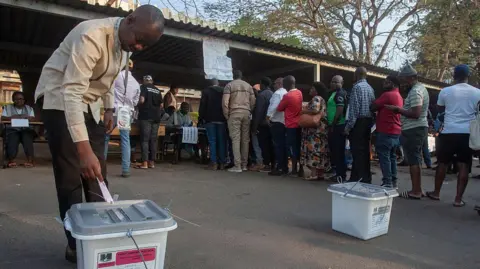Malawi's Presidential Elections: A Struggle Amid Rising Costs and Inflation
Malawians are casting their votes in crucial presidential and parliamentary elections, rooted in significant socio-economic turbulence over the past five years. With severe inflation, fuel shortages, and increasing living costs as key concerns, the electorate is seeking drastic change.
The incumbent President, Lazarus Chakwera, is defending his seat against Peter Mutharika, an 85-year-old former leader, who has held office in the past. This election is marked by the harsh reality of life for many Malawians who are reeling from prolonged economic crises.
The polls opened early on Tuesday, with a total of 7.2 million registered voters participating in choosing not only a president but also 229 parliamentarians and 509 local councilors, thereby holding the potential to profoundly alter the political landscape of Malawi.
Key Candidates and Their Stands
Chakwera's tenure has faced numerous challenges, including rising allegations of corruption and economic management issues. However, he touts achievements like reintroducing train services and major infrastructure improvements. On the other hand, Mutharika has been criticized for his links to corruption and economic turmoil during his previous administration.
Among the 17 presidential candidates, the competition is intense, with many citizens expressing their priorities—primarily economic stability and a commitment to fighting corruption, along with rebuilding trust in the government.
Electoral Process
The new electoral framework implemented post-2019 mandates that a candidate must achieve over 50% of the votes to secure victory in the first round, suggesting a significant chance of a run-off given the divided choices and strong contenders.
Despite a history marred by political instability and allegations of voter manipulation, the recent advancements in the legal oversight of elections have garnered some confidence among voters. However, fears of electoral biases persist, with accusations against the electoral commission resonating in civil society.
Conclusion
This election marks a critical juncture for Malawi as it strives to redefine its political narrative amidst significant hardships. As votes are counted, the nation watches closely, hopeful for a leader who can address the pressing economic challenges and restore faith in governance.




















